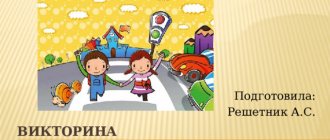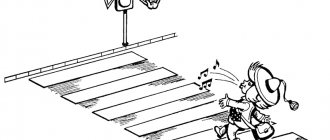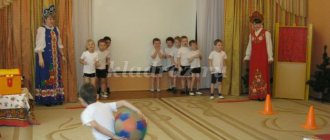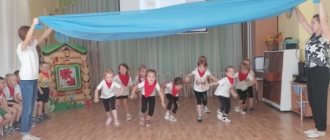Road alphabet, or for children about traffic signs
Cars, roads with active traffic, pedestrians, traffic lights - surround us since childhood. And the adult world knows how dangerous it can be on the road and how important traffic rules are. Moreover, they are important not only for drivers, but also for other road users. Today we will tell the children about traffic signs.
It is advisable to teach a child the rules of the road from the age of 3, but it is important to remember that he absorbs our example even when he is sitting in a stroller))). In addition to the rules, it is important to tell children about types of transport, what braking distance is and why it is sometimes not as fast as we would like...
It should be taken into account that until the age of eight, tunnel vision predominates in a child, that is, the child does not notice what is on the sides, he sees only what is in front, and therefore he needs to be explained, and even several times, that before crossing the road, you need to look left and right.
Basic rules for a pedestrian:
Telling children about the rules of the road starts with the rules for pedestrians. After all, at first each of us is a pedestrian.
- You need to walk exclusively on the sidewalk, on the right side.
- You need to cross the street at a pedestrian crossing if there is no traffic light.
- If there is a traffic light, you need to cross the road when the signal is green.
- If the traffic light opposite you is yellow or red, under no circumstances should you cross the street.
- You definitely need to look around to see if there are any cars and only then cross the road.
- If you are outside the city where there is no sidewalk, you need to walk along the side of the road away from traffic.
Traffic signs
Today we will pay close attention to traffic signs. We will not only show them and talk about them, but also read good poems about traffic signs. We see many signs on the roads. It is important when walking with children, crossing streets on foot or by car, to pay attention to the signs. You need to explain their meaning and try to get the child to remember what the sign looks like and what it says. You can start talking about them as early as 5 years old.
Let's look at the traffic signs that children need to remember first. Let's look at 6 types of traffic signs.
When the number of cars, trucks, buses and other types of transport began to increase on the roads, a unique language was created. When trams ran through the streets, cars, trolleybuses, buses rushed, the streets had to be given a language. This road language is spoken to drivers and pedestrians on the streets of all countries of the world.
Road language is special signs of different shapes and colors that convey vital information to drivers and pedestrians. Road signs are divided into groups, uniting them by content. For example:
1.Warning signs
These signs warn us of danger and are designed to increase our attention. Warning signs, for the most part, have the shape of a triangle with a red border around the perimeter. They warn us that there is a dangerous turn ahead, or a railway crossing, or there are children nearby - a school or kindergarten.
Traffic light regulation sign
Red, yellow and green - This is the voice of the traffic light. He says: “Stop! Kati! If yellow - “Wait!”
A traffic light is drawn inside the triangle. This sign warns of approaching a section of the road controlled by a traffic light. Do not under any circumstances cross the road when it is red. If the light turns yellow, you need to wait, but when the light turns green, you need to look around and calmly cross the road.
Pedestrian crossing sign
On the pedestrian path, only feet walk. Only in a stroller, kids can ride slowly.
Inside the sign there is a drawing of a man crossing the road at a zebra crossing. Next to this sign there is always a pedestrian crossing, that is, a zebra crossing. This means you can cross the road, but don’t forget to look to the right and left before you take a step along the zebra crossing.
Sign "Caution - Children"
Hey, driver, be careful, It’s impossible to drive fast, People know everything in the world. Children walk in this place.
Running children are painted inside the sign. Usually these signs hang near children's institutions, such as schools, kindergartens, camps, etc.
Dangerous turn sign
This sign sounds the alarm - Here is a dangerous turn! Of course, you can drive here, but only very carefully - do not overtake anyone, do not change passengers.
This sign indicates a dangerous section of the road with a sharp, difficult to see turn.
Priority signs.
These signs tell us the correct order of passage for a certain section of the road. They come in different shapes and colors. As a rule, their effect applies more to drivers. Among the priority signs are the following:
Main Road Sign
Here is a sign, of which there are few: This is the main road! If you drive along it, you become more important than everyone else, and, as if to God, everyone makes way for you!
Indicates the road with priority.
Give way sign
Changeling on the way Means, give in. Turned the triangle, Pay attention, schoolboy! Where the driver meets a sign, he gives way.
It is important not only for drivers, but also for pedestrians to know the “Give Way” sign. This is the only inverted triangle among the signs and it tells us that we are approaching the main road and must yield.
STOP sign
You, driver, don't rush, you see the sign, stop! Before you continue your journey, don’t forget to look around.
Indicates that drivers must stop for 5 seconds. After which you can continue moving. As a rule, this sign is installed in front of posts, customs and railway crossings.
Prohibition signs.
The very word “prohibiting” speaks for itself. These are signs that restrict road traffic. They look like a round sign in a red frame.
No Bicycles Sign
The sign looks strictly at everyone, It strictly forbids us to ride bicycles and their relatives - mopeds.
There is a bicycle inside the sign. This means that you cannot ride a bicycle on this section of the road.
Sign "Pedestrian traffic prohibited"
No pedestrians walk here in rain or shine. The sign tells them one thing: “You are prohibited from walking!”
A pedestrian is drawn inside the sign, crossed out with a red line. In this case, you cannot walk on this section of the road.
"No entry" sign.
The sign scares drivers and prohibits entry for cars! Don't try to rush past the brick!
This “brick” - as it is popularly called - is known to everyone. After all, it prohibits the entry of all vehicles in this direction, including bicycles.
Mandatory signs.
These are, so to speak, recommended signs. They can be canceled as unnecessary, or installed if necessary. They can be either round, triangular or square, and are usually painted blue.
Bicycle path sign
This sign is like a red light, there is no way for cars here. The kingdom here is of bicycles, pedestrians and mopeds.
Bicycle path Overtake Maxim Seryozhka. No one will bother you - All children know this sign.
Blue circle with a bicycle pattern. This means that on this stretch of road it is safe to ride and learn to ride a bike.
Pedestrian path sign
The sign tells us: “Friends! You can’t drive here at all!” Those who are familiar with the signs only walk past.
A blue sign, in the form of a circle, with a drawn man. This means that this section of the road is for pedestrians only.
Information and directional signs
Signs on blue squares indicate where an underground, overground or pedestrian crossing is located.
Sign "Underground pedestrian crossing"
A long entrance leads down from the sidewalk. Under the road. There is no door or gate - It's an underground passage.
Inside the blue square, there is a drawing of a man walking down the steps. This means that next to you is not a zebra crossing, but an underground passage. There is also a sign where a person is climbing steps, this means that the pedestrian crossing is above the road.
Dead End sign
This sign will surely lead to a dead end. Well, then at least fly, Because there is no way!
In the blue square there is a road at the end of which there is a red brick. This means that at the end of the road there is a dead end, it is better to go around the road from another street.
Pedestrian crossing sign
Everyone knows the stripes. Children know, adults know. A pedestrian crossing leads to the other side.
A blue square with a white triangle inside it with a pedestrian on a zebra crossing. Everything is clear here, we cross the road at the zebra crossing, but don’t forget to look both ways.
Service Marks.
Another large group of informative signs are service signs. These are blue rectangle signs with pictures: a spoon and fork, a bed, a red cross... They colorfully indicate that a first aid station, a resting place or a hotel is nearby.
First aid station sign
If someone breaks their leg, doctors here will always help. They will provide first aid, and they will tell you where to go for further treatment.
Inside this white square is a red cross. This means there is a clinic or hospital nearby.
Sign "Food station"
Here is a fork, here is a spoon, We refueled a little, We fed the dog too... We say “thank you” to the sign.
Also inside this white square are cutlery, a fork and a spoon. This means there is a cafe or canteen nearby, or maybe a restaurant.
Stop sign
Stop, crowd of people. The bus will arrive soon. City transport is waiting here, going to the office, to the workshop, to home. They go to school, kindergarten, on holiday they go to the parade. In the street cycle Urban transport is held in high esteem!
There is a picture of a bus in a white square. This means you can wait for public transport near this sign.
Recreation area sign
If you are tired on the road, If you go far, Rest a little driver, There is a place reserved here.
You can also see a sign with a Christmas tree and a bench inside this square. This means you can spend your holiday in nature there.
These are the main groups of road signs with which you need to start teaching your child the road alphabet. Further more! Traffic signs are the alphabet of the roads, a unique language for drivers and pedestrians from all over the world! The article and explanation were adorned with poems about traffic signs by Olesya Emelyanova.
With modern toys it is simply magical to teach children the rules of the road. Don't believe me? Watch this educational cartoon about traffic signs with your whole family:
Here is a traffic alphabet in which letters and phrases make up traffic signs. Be sure to teach your children about traffic signs. This science is perhaps even more important than the history of geography. After all, it is not on the map, but in life. Safety comes first!
More about traffic rules for children:
Children's riddles about traffic rules
Poems about traffic rules for children
Children about the basic rules of the road.
Children about transport. History of transport
Poems and riddles about transport
Curious and active children to you!
With love,
"Flowers of life".
Article “Training traffic rules for pupils in kindergarten”
Article “Training traffic rules for pupils in kindergarten”
Solving the problem of ensuring road safety is considered a priority. The problem of childhood injuries is becoming more acute. The main factor in road accidents is human. One in nine children becomes a victim. Most often this is due to failure to comply with traffic rules: it is difficult for a child to understand what traffic flow is, what braking distance is, how quickly the driver will react to the situation.
Preschoolers do not yet have a protective reaction to traffic conditions. Once on the street, a child finds himself in a danger zone, so he should be taught to find a quick solution to get out of a difficult situation.
In our kindergarten, starting from preschool age, we begin to teach children the rules of the road. Instill in them the skills of safe behavior in a traffic situation and a positive attitude towards solving this problem. The behavior of adults on the road plays a great influence on the formation of a child’s behavior on the street.
It is important not to frighten a child with the street or traffic, but, on the contrary, to develop in him responsibility, confidence, attention, composure. The child must understand the concept of “close”, “far”, “left - right”, “behind”, “in the direction of travel”. Indeed, often the absence of these qualities becomes the cause of road accidents.
My task, as a teacher, is to provide basic knowledge of traffic rules. The importance of preschool acquisition of skills is argued by the fact that it is during the transition from kindergarten to school that the child can navigate the spatial environment, be able to observe and assess road situations, and possess the skills of safe behavior in various situations.
The best example for a child is us adults. If moms and dads break traffic rules, then children will break them too. Adults should be an example for their children. At home, parents can talk about the rules of the road in their own words. Walking down the street from kindergarten, talk to your child about vehicles, explain their features. The child's perception of information about traffic rules will be influenced by indications of drivers or pedestrians who have violated these rules. While walking with your child, you can use the option of unobtrusive stories using road situations. The main task of parents and teachers is to clearly explain the rules, and when choosing forms of education, to convey to children the meaning - the danger of non-compliance with the rules.
A very effective method is to read poems, children's books on traffic safety, and riddles to children. Traffic rules for preschoolers are also important for group trips accompanied by teachers. When traveling on foot, children usually line up in pairs and walk along the sidewalk. We cross the road only at a pedestrian crossing. The teacher stands in the middle of the road, holding a red flag until all the children cross to the other side. This is how we go to the library with our students.
When teaching children, I use various teaching materials. These are children's fiction and methodological literature, posters, paintings, lesson notes, showing cartoons on traffic rules, didactic games, outdoor games, physical exercises, poems, riddles.
Using game, story-based and integrated forms of educational activities in our work, we help students plan their actions on the basis of primary value concepts that comply with basic generally accepted norms and rules of behavior on the street and in transport. Only in close cooperation between the kindergarten, the family and the road patrol service will the knowledge acquired by preschoolers and the rules learned become the norm of behavior, and their observance will become a human need.
It is important to remember that the example of parents is one of the main factors in successfully developing children's skills for safe behavior on the road.
Junior group. Early childhood, nursery. Children 1-4 years old
Educational educational game for children of the younger group from 1.5 to 3 years old “Basics of road safety”
EDUCATIONAL DEVELOPMENTAL GAME FOR CHILDREN OF THE JUNIOR GROUP FROM 1.5 TO 3 YEARS OLD “BASICS OF ROAD SAFETY ” Purpose: to introduce children to the concepts of a big road for cars ; - small road (sidewalk)
for a person;
— children's playground; - a striped road for crossing...
Photo report on the “Traffic Light” modeling lesson for young children
I would like to present to you my photo report on modeling with young children on the topic “Traffic Light”
.
As part of introducing children to basic traffic rules . Children from an early age need to be introduced to traffic rules. This acquaintance takes place in different types of activities. These are movable ...
Visit a children's auto town with your child
Children's auto town is a playground with a mini-version of streets and roads. There is:
- roadway with intersections;
- traffic signs;
- pedestrian crossings;
- speed bumps;
- transport stops;
- railway crossings with barriers;
- traffic lights at which signals are switched.
In motor towns there is a toy fleet: cars, trucks, trams, buses that a child can ride on.
In the motor town, the child learns to cross the road with and without a traffic light, learns how to act correctly in dangerous situations on the road, but does it safely.
Children's auto town opened in Chelny
Auto towns can be found in entertainment centers; they are made in playrooms, lyceums, and driving schools. Parents can buy a ready-made set of items for a car town and make it in the kindergarten or school where the child studies.
A set of items for a motor city costs from 14,000 rubles. Source
Learn poems about traffic rules with your child, make riddles
Just learning and understanding traffic rules can be difficult. And in the form of poetry, it is easier for a child to remember the rules.
Using this poem, the child will remember when it is possible to walk across the road and when not. Source
Riddles will help you remember the concepts used in traffic rules: roadway, sidewalk, underpass, traffic light, railway crossing.
It is more fun and interesting for a child to solve riddles than to answer ordinary questions about traffic rules. Source
Show your child educational videos and cartoons
There are many videos on YouTube in which children are told the rules of the road:
- "Lukomorye Pictures". Series “Traffic Light”, “Sign “Caution, Children!””, “Pedestrian Crossing”.
- "Lessons from Aunt Owl." Series “The Road” and “The ABCs of Road Safety.”
- "Robocar Poli. Traffic Laws".
- “Smeshariki. The ABC of Security." Episodes 1–7, 12, 14–16, 20, 24–32.
- Video lesson on the world around us “So that the path is happy.”
- Educational video “Road Rules (TRAF) for children: road safety.”
From videos and cartoons, the child will learn how to behave on and near the roadway, what rules should be used to cross the road, and what will happen if you do not follow the rules.
Article on traffic rulesarticle (middle group) on the topic
It is very important in preschool age to develop skills in following the rules of behavior on the street and road. Traffic is making roads increasingly dangerous for children. Of all traffic participants, the most undisciplined are pedestrians. Accidents with children occur on the streets because children either do not know the traffic rules or violate them without realizing the dangerous consequences. Therefore, it is very important to instill in children a sense of responsibility for their behavior on the street and to ensure that compliance with traffic rules becomes a habit for them. And the teacher’s task is to instill in children skills and abilities related to road safety.
We teach children traffic rules from an early age. In kindergarten, a child must learn the basic concepts of road traffic, as well as learn the most important rules of behavior on the road.
Our group has created a “Safety Corner”, where visual and game material on traffic rules is collected. Children play games independently and look at illustrations. We introduce children to fiction on traffic rules: S. Mikhalkov “Uncle Styopa the Policeman”, “Traffic Light”, “Truck”, B. Zakhoder “Chauffeur”, A. Barto “Truck”, etc. We created a folder with riddles about pedestrian crossings, traffic lights, and road signs, which the children take to look at on their own. We conduct didactic games and word games with children: “Light the traffic light”, “We are drivers”, “Guess the sign”. We play outdoor games: “Bus”, “Truck”, “Sparrows and a car”, role-playing games: “Transport”, “I am a driver”. We conduct conversations: Why do we need a traffic light, why do we need road signs, is it possible to play on the road, why can’t we play on the road? Together with the children, we drew “Traffic Light” with cotton swabs in order to reinforce the traffic light signals. We observe moving vehicles while walking.
To instill in our children the skills of correct behavior on the street and road, we need painstaking, everyday explanatory work with the participation of parents. The knowledge acquired by children in kindergarten should be reinforced at home, in the family. In the reception areas we post consultations for parents “We follow traffic rules for adults and children”, “Children’s car seats”, “Laws of streets and roads”, etc. First of all, parents should remember the power of personal example: if mom, dad or grandmother crosses the street in an unauthorized place, does not pay attention to traffic lights, or runs across the road at a close distance from traffic, then the most conscientious work of the teacher will be ineffective. You need to remember, you are not alone on the street! Children follow the example of adults!
The final event for children was the entertainment “In the Country of Traffic Lights”.
It was carried out with the aim of establishing traffic rules on the road. The traffic inspector came to visit the children. Children recited poems about the colors of traffic lights, solved riddles, played games based on traffic rules “Assemble a traffic light”, “Traffic light”. At the holiday there was a model of a traffic light, the children had to complete all the correct tasks for each color. The traffic inspector tested the children's knowledge and asked questions: How many signals does the traffic light have? Why do you need a traffic light? What is the name of a person who drives a car? Why is a pedestrian crossing needed? Where should I wait for the bus? How should you behave on public transport? The children completed all the tasks and found it very interesting. And as a souvenir of his meeting, he gave each child a “Traffic Light” emblem.
Work on developing children's safe behavior skills on the streets and roads is carried out systematically, covering all types of children's activities, so that children “pass” the acquired knowledge through productive activities, and then implement it in games and in everyday life, outside the kindergarten.





